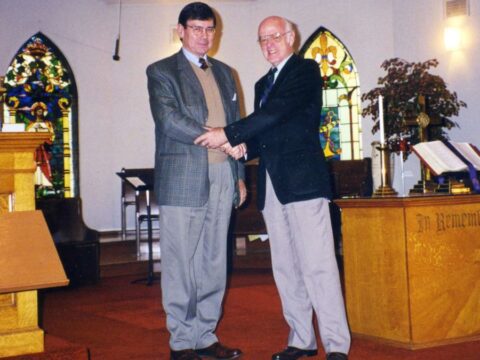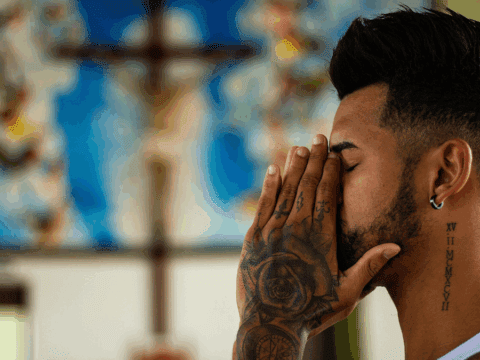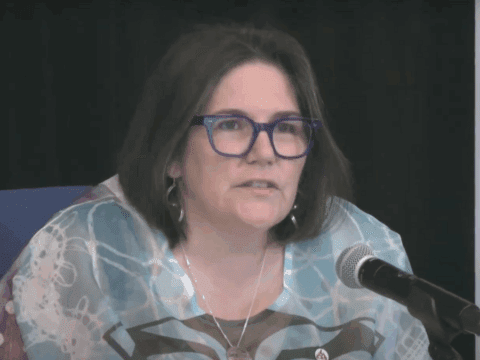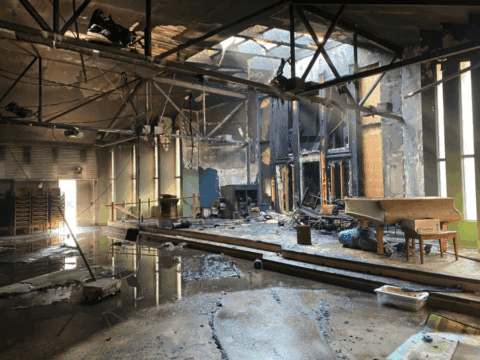Delaine Copenace, a 16-year-old Anishnaabe girl, went missing from a downtown Kenora, Ont., street last winter. At Knox United, where I serve as minister, we soon learned that a gathering place was needed to organize a community search, and offered our gym and kitchen. At the time, no one knew how much it would change us.
Knox members, led by Marlyne Crawford, worked with community volunteers to make and serve sandwiches, wild rice soup, bannock and other foods, wash dishes, clean bathrooms and sweep floors — all to support the 120 or so searchers who needed a place to rest and refuel before heading out again in search of a sign or a clue.
You may unsubscribe from any of our newsletters at any time.
As Delaine’s family shared their stories, their fears and their determination to find their lost child, relationships formed. People gathered, ate, comforted, prayed, hugged, drummed and held vigils. The Knox gym began to fill with prayers and artwork. The healing aroma of sage smudge filled the air.
I wish I could say that Kenora’s two predominant cultures (Anishnaabe and Anglo-Saxon) mix easily, but there are few places where this happens. We are often two solitudes. But on the first Sunday morning after the search for Delaine began, the hearts of Knox’s congregation were turned to prayer for her and her family.
Later, the sage smoke thickened and began wafting into our annual meeting space. I went to see what was happening. Delaine’s parents, twin and older sisters had just done an emotional interview with CBC TV, pleading for information. As Knox’s congregational meeting wrapped up, I told them what was happening. No one spoke, but eyes brimmed with sadness and compassion.

As days turned into weeks, search numbers dwindled. But Anishnaabe women and men, some of them elders, continued to come to Knox and sit. Sometimes they were silent; sometimes they talked. I found myself wondering why they came. Little by little, a story was shared and then another, and I began to understand. Every person had a story: loss, abuse, a tragic death, a suicide. Most had multiple stories of trauma. The gym became a place to be with others in the face of heartbreak. A place to hold vigil with others.
Twenty days later (on the Tuesday of Holy week), a city worker found Delaine’s body in the frozen water at a dock. How she got there, through the two feet of ice that had covered the lake in February, remains a troubling mystery that haunts her family and this community. People gathered quietly at Knox.
Words cannot express how we felt when Delaine’s mother, Anida Ross, asked if Knox would host her daughter’s traditional four-day, open-coffin wake and funeral, saying: “This is where we gathered all this time. It seems right.” Trust had grown.
The wake was tender: family and friends spent time with Delaine’s body and each other, saying what they needed to say — loving, longing, grieving. Dayna, Delaine’s twin, and others held overnight vigil with her. The night before the funeral, the gym — now full of people — was quiet and dark, with one candle lit and only the sound of gentle singing. The funeral, led by Anishnaabe Elder Peter White, was a beautiful ceremony of letting go.
Knox will never be the same. Hugs are still exchanged between those who came together to search and grieve. After the funeral, Daryl Redsky, one of the Anishnaabe leaders in the search, said: “I never thought I’d live to see the day that this would happen in a church. Delaine has done something here. She has brought our communities together.”
This story originally appeared in The Observer’s January 2017 issue with the title “Roads to reconciliation.”














